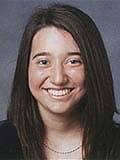
A mother stands in line waiting to pick up a prescription, a crying baby in one arm and a toddler tugging on the other. Behind the counter, Rebekah (Gruver) Garris (Pre-Pharmacy ’10) greets the woman with a smile. As she attends to the woman, she silently prays for her as she’s prayed for the other customers that day and every day.

“I love getting to help people, whether that’s getting them the medications they need, helping them better understand their health conditions, or just taking a moment to listen to them and offering to pray for them if they’re going through a difficult time,” said Rebekah.
For the last three years, she has worked as the pharmacist-manager at D-REX Pharmacy, a local Christian-owned business in a town with less than 3,000 people.
She feels that her employment at D-REX was a direct result of the strong foundation she received in college. “The pre-pharmacy program at Pensacola Christian College was exactly what I needed to prepare me for academic success in pharmacy school and to give me a strong foundation upon which to build my professional career,” she said.
That foundation was established through classes like College Physics, Organic Chemistry, Analytical Chemistry, Microbiology, General Biology, and Biochemistry.
The teaching of Dr. Carlos Alvarez in Sociology for Health Professions gave Rebekah a deeper understanding of people and emphasized the importance of taking the time to get to know them. Dr. Alvarez strives to teach his students three tools to advance in pharmaceutical school.
“We emphasize academic performance, practical experience, and service,” he said. “A heart for the community stands out on a résumé. We emphasize interacting with multiple cultures through Christian Service and on mission trips. If students do everything, they’ll be very competitive for pharmaceutical school.”
Dr. James Ridgley, who teaches physics classes at PCC, strives to develop his students’ critical thinking skills. “I want to prepare them for the advanced analytical processes that they will encounter later,” he said. “We do not merely teach theory, but students have the ability to learn foundational concepts within their field. They get hands-on experience with multiple lab courses and have the ability to practice the theories and concepts.”
While graduates in this field can be pharmacists in community retail stores like CVS, Rite Aid, and Walgreens, they can also be clinical pharmacists or consultants in hospitals, clinics, and other healthcare facilities. Some even choose to work on the research side in the pharmaceutical industry developing new drugs, conducting drug trials, or establishing safety regulations.

Recent graduate Jeffrey Reagan Snow (Pre-Pharmacy ’16), currently enrolled in the Doctor of Pharmacy program at Union University, is grateful for the preparation he received at PCC.
“The pre-pharmacy program at PCC more than prepared me for this next step in my life,” he said. “My educational background was more advanced than many of my fellow classmates because of the classes and requirements placed on me by PCC’s program. The first semester of classes in the Doctor of Pharmacy program was almost entirely a review of material I had already learned from my undergraduate degree. As a result, I have now finished my first year and am carrying a 4.0 into my second year. I am convinced that students graduating with a degree in pre-pharmacy from PCC are equipped to handle doctorate school.”
Perhaps the greatest tool that PCC’s pre-pharmacy students take away from their undergraduate years is a heart attentive to the needs of their patients. Each day as these pharmacists measure out prescriptions, they’re not just filling bottles, they’re filling hearts.
Read more about how God is directing and working through PCC faculty and alumni.
